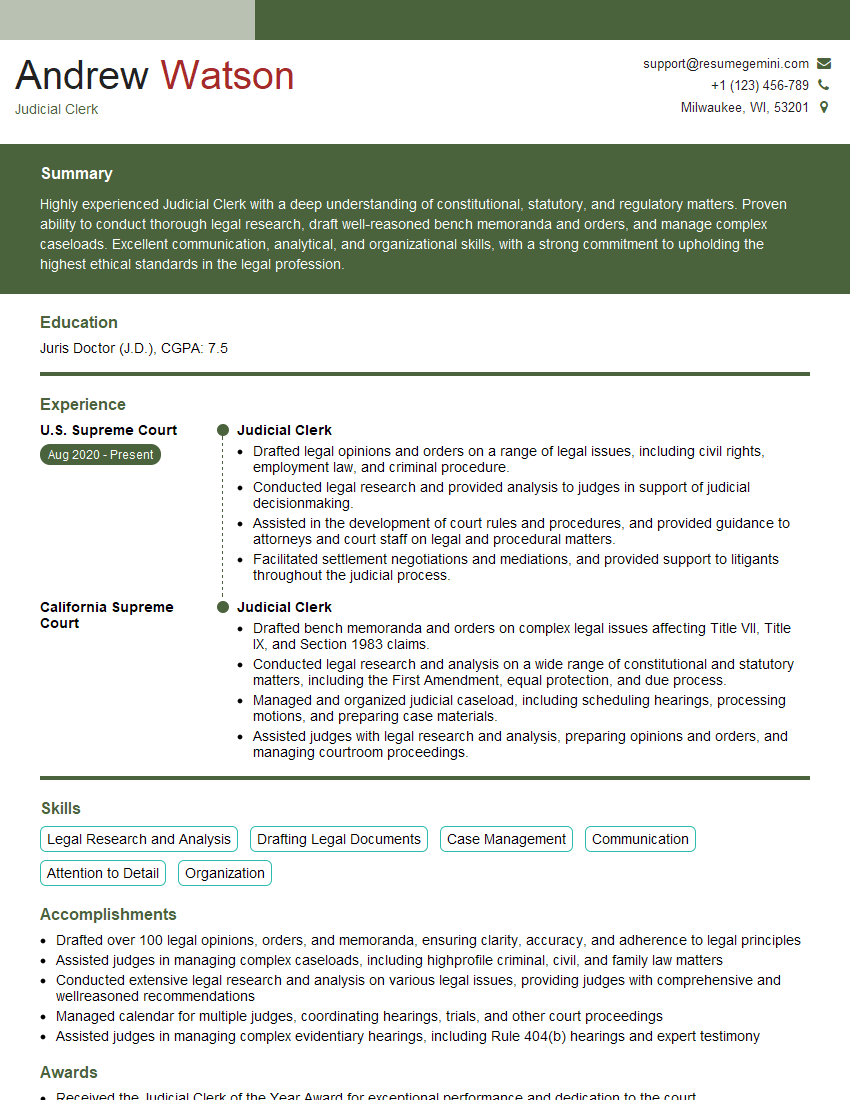Are you a seasoned Judicial Clerk seeking a new career path? Discover our professionally built Judicial Clerk Resume Template. This time-saving tool provides a solid foundation for your job search. Simply click “Edit Resume” to customize it with your unique experiences and achievements. Customize fonts and colors to match your personal style and increase your chances of landing your dream job. Explore more Resume Templates for additional options.

Andrew Watson
Judicial Clerk
Summary
Highly experienced Judicial Clerk with a deep understanding of constitutional, statutory, and regulatory matters. Proven ability to conduct thorough legal research, draft well-reasoned bench memoranda and orders, and manage complex caseloads. Excellent communication, analytical, and organizational skills, with a strong commitment to upholding the highest ethical standards in the legal profession.
Education
Juris Doctor (J.D.)
July 2016
Skills
- Legal Research and Analysis
- Drafting Legal Documents
- Case Management
- Communication
- Attention to Detail
- Organization
Work Experience
Judicial Clerk
- Drafted legal opinions and orders on a range of legal issues, including civil rights, employment law, and criminal procedure.
- Conducted legal research and provided analysis to judges in support of judicial decisionmaking.
- Assisted in the development of court rules and procedures, and provided guidance to attorneys and court staff on legal and procedural matters.
- Facilitated settlement negotiations and mediations, and provided support to litigants throughout the judicial process.
Judicial Clerk
- Drafted bench memoranda and orders on complex legal issues affecting Title VII, Title IX, and Section 1983 claims.
- Conducted legal research and analysis on a wide range of constitutional and statutory matters, including the First Amendment, equal protection, and due process.
- Managed and organized judicial caseload, including scheduling hearings, processing motions, and preparing case materials.
- Assisted judges with legal research and analysis, preparing opinions and orders, and managing courtroom proceedings.
Accomplishments
- Drafted over 100 legal opinions, orders, and memoranda, ensuring clarity, accuracy, and adherence to legal principles
- Assisted judges in managing complex caseloads, including highprofile criminal, civil, and family law matters
- Conducted extensive legal research and analysis on various legal issues, providing judges with comprehensive and wellreasoned recommendations
- Managed calendar for multiple judges, coordinating hearings, trials, and other court proceedings
- Assisted judges in managing complex evidentiary hearings, including Rule 404(b) hearings and expert testimony
Awards
- Received the Judicial Clerk of the Year Award for exceptional performance and dedication to the court
- Recognized for outstanding contributions to the development and implementation of a new case management system
- Received the Pro Bono Award for exceptional commitment to providing legal assistance to indigent clients
- Honored for excellence in legal writing and editing, consistently producing highquality legal documents
Certificates
- Certified Legal Clerk
- Certified Paralegal
- Registered Legal Assistant
- Accredited Legal Professional
Career Expert Tips:
- Select the ideal resume template to showcase your professional experience effectively.
- Master the art of resume writing to highlight your unique qualifications and achievements.
- Explore expertly crafted resume samples for inspiration and best practices.
- Build your best resume for free this new year with ResumeGemini. Enjoy exclusive discounts on ATS optimized resume templates.
How To Write Resume For Judicial Clerk
- Highlight your legal research and writing skills by showcasing your ability to analyze complex legal issues and draft well-reasoned legal documents.
- Demonstrate your case management and organizational skills by describing your experience in managing a heavy caseload and ensuring the smooth flow of judicial proceedings.
- Emphasize your communication skills by providing examples of how you effectively communicated with judges, attorneys, and litigants in a professional and respectful manner.
- Showcase your commitment to ethical conduct by highlighting your adherence to professional standards and your dedication to upholding the integrity of the legal system.
Essential Experience Highlights for a Strong Judicial Clerk Resume
- Draft bench memoranda and orders on complex legal issues affecting Title VII, Title IX, and Section 1983 claims.
- Conduct legal research and analysis on a wide range of constitutional and statutory matters, including the First Amendment, equal protection, and due process.
- Manage and organize judicial caseload, including scheduling hearings, processing motions, and preparing case materials.
- Assist judges with legal research and analysis, preparing opinions and orders, and managing courtroom proceedings.
- Draft legal opinions and orders on a range of legal issues, including civil rights, employment law, and criminal procedure.
- Conduct legal research and provide analysis to judges in support of judicial decision-making.
- Assist in the development of court rules and procedures, and provide guidance to attorneys and court staff on legal and procedural matters.
Frequently Asked Questions (FAQ’s) For Judicial Clerk
What is the role of a Judicial Clerk?
A Judicial Clerk assists judges in the performance of their judicial duties, including conducting legal research, drafting legal documents, managing caseloads, and providing administrative support.
What qualifications are required to become a Judicial Clerk?
Typically, a Juris Doctor (J.D.) degree from an accredited law school and excellent legal research, writing, and analytical skills are required.
What are the benefits of being a Judicial Clerk?
Judicial Clerks gain invaluable experience in legal research, writing, and analysis, as well as insights into the judicial decision-making process.
How can I apply to become a Judicial Clerk?
Applications for Judicial Clerk positions are typically submitted directly to the judge or court to whom you are applying.
What is the salary range for Judicial Clerks?
The salary range for Judicial Clerks varies depending on factors such as the location, level of experience, and size of the court or firm.
What are the career prospects for Judicial Clerks?
Many Judicial Clerks go on to successful careers in law, including as judges, attorneys, law professors, and government officials.
Is there a difference between a Judicial Clerk and a Law Clerk?
The terms ‘Judicial Clerk’ and ‘Law Clerk’ are often used interchangeably, but a Judicial Clerk typically works for a judge, while a Law Clerk may work for a judge, law firm, or other legal organization.